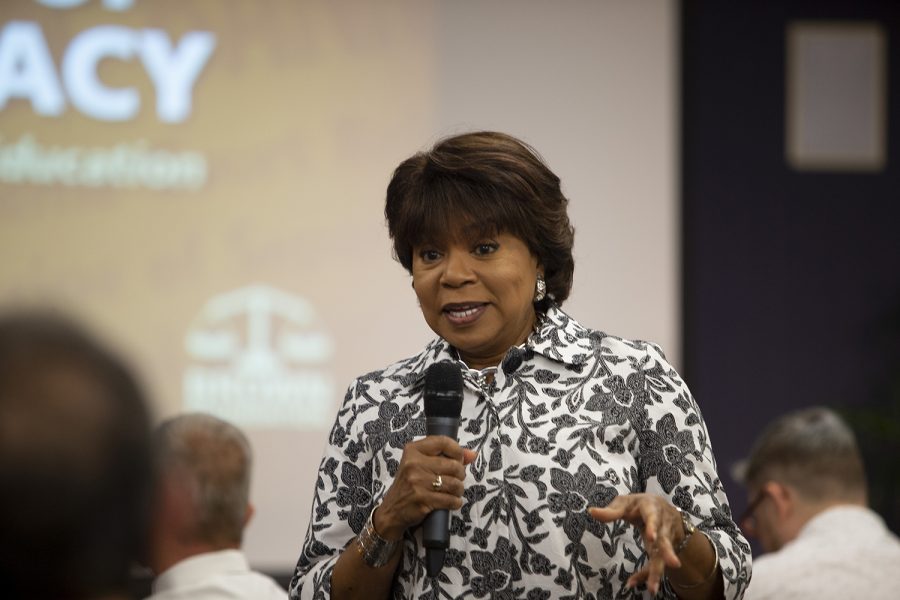Brown v. Board of Education still inspires inclusiveness in education
In commemoration of the 65th anniversary of Brown v. Board of Education, local high school teachers who prioritize inclusivity were awarded with Inclusive Teaching Awards.
Cheryl Brown Henderson gives the keynote address during the Inclusive Teaching Awards ceremony on Friday, June 28, 2019 at the Iowa City Public Library. She is one of three daughters of Oliver Brown, the names plaintiff in the Brown v. Board of Education Supreme Court case.(Emily Wangen/The Daily Iowan)
June 28, 2019
Local teachers, nominated by their students, were honored with awards commemorating their commitment to inclusiveness in an event on June 28 at the Iowa City Public Library.
The Iowa City Human Rights Commission coordinated the inaugural Inclusive Teaching Awards with the 65th anniversary of the landmark U.S. Supreme Court decision Brown v. Board of Education.
The 1954 case overturned the “separate but equal” justification for racial segregation in schools and public facilities, and the decision was integral to sparking the ongoing fight for civil equality. Kristin Watson, the city’s human-rights investigator, said the anniversary seemed like the perfect time to honor teachers who prioritize inclusiveness.
“We advertised it in the schools, asking students to nominate teachers who they thought were inclusive,” Watson said. “Because high school students may not know what ‘inclusive teaching’ means to us, we gave them criteria to reference in their essays if they wanted to, or they could just talk about how they felt the teacher was inclusive.”
Four teachers from local high schools were honored, all of whom attended the University of Iowa. Awardees were Tony Balcaen of City High, Lisa Petrie of Tate High, John Demory of Regina Catholic Education Center, and Travis Henderson of West High .
The winners received commendations from students about making their classrooms an open and welcoming space for all voices. During each acceptance, the educators emphasized that demonstrating equality for people of a young age can make a great difference.
“As a parent, what I’ve tried to do with my own kids is just instill in them a sense of the general humanity of everyone,” Watson said. “No one is more human than anyone else. We can’t keep sorting each other into groups and saying one group is worth more than another. We’re all human.”
Cheryl Brown Henderson, a daughter of the plaintiff the Rev.Oliver Brown in Brown v. Board, gave the keynote address. Brown Henderson discussed the details of the case and her own experiences of injustice as a black woman in America. A previous teacher herself, she stressed the importance of the U.S. educational system and that teachers deserve more recognition.
Several sponsors helped to fund the event and bring Brown Henderson to Iowa City to speak. The University of Iowa College of Law and College of Education were two of the largest donors.
“I think Brown v. Board of Education serves as a powerful precedent and role model on the collective efforts of people that strive for equity and inclusion,” Education College Dean Daniel Clay said. “Equality can lead to better outcomes and better results, but it takes a collective dedication and commitment to that end.”
Iowa is no stranger to the importance of political activism. Caucuses are vital to the U.S. election process and consistently put Iowa at the center of important nominations. Amy Weismann, the assistant director of UI Center for Human Rights, detailed the legacy of Brown v. Board in our current political decisions.
“We need to take seriously our role and responsibilities as engaged citizens,” Weismann said. “The courts gave us tools to utilize, and in order to realize the rights that were articulated, we have to act. That means voting into office people who understand the value and necessity of equal-rights education settings, and voting out those who undermine them.”



